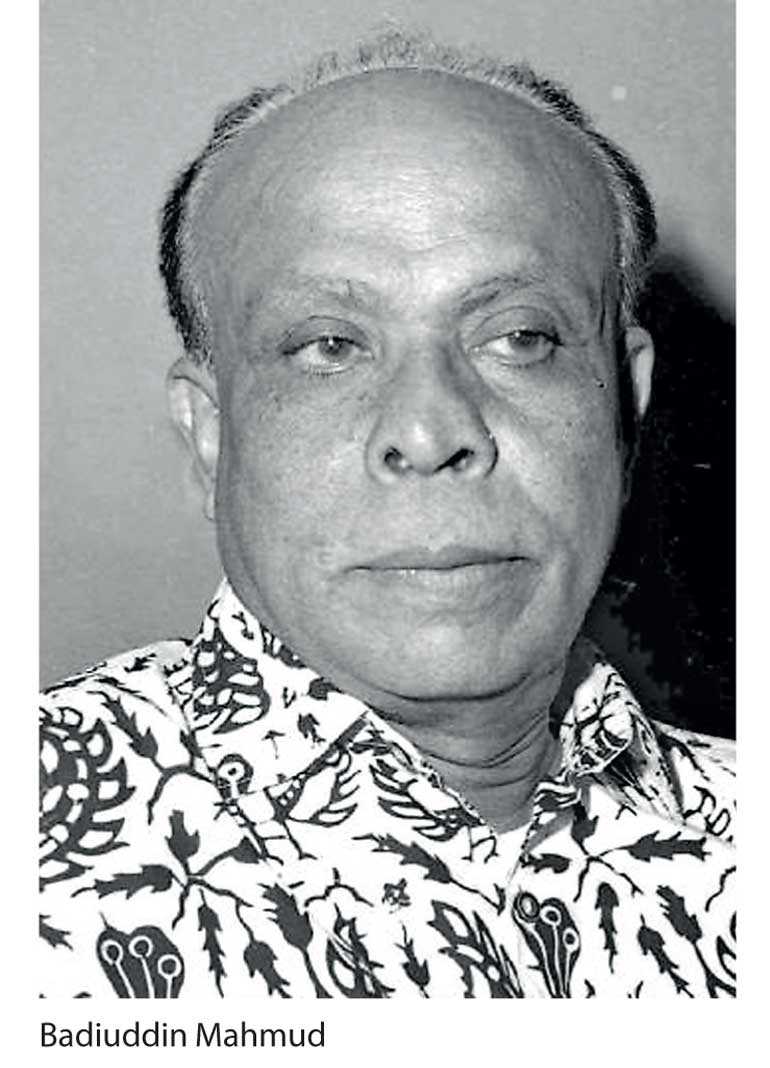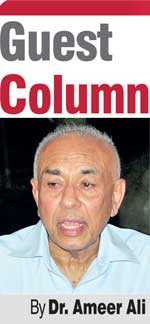Sunday Feb 15, 2026
Sunday Feb 15, 2026
Friday, 27 July 2018 00:00 - - {{hitsCtrl.values.hits}}

 Badiuddin Mahmud (1904-1997), or Badi as he was popularly known, was a product of Aligarh University, an educationist, a founder member of the Sri Lanka Freedom Party (SLFP) and a Government Minister in Sirimavo Bandaranaike governments.
Badiuddin Mahmud (1904-1997), or Badi as he was popularly known, was a product of Aligarh University, an educationist, a founder member of the Sri Lanka Freedom Party (SLFP) and a Government Minister in Sirimavo Bandaranaike governments.
Above all, he was an exceptional Muslim political leader whose intellectual acumen, political foresight and uncompromising stand on national issues made him unique when compared to Muslim leaders who preceded him.
His services to the Muslim community, especially as the Minister of Education from 1960-1965 and from 1970 to 1977, tantamount to a mini-revolution in the sense that it radically changed the image of his community from one of traders and businessmen to that of teachers and professionals.
From the time of the British colonial era, the Muslim community because of its mono-focal commitment to trade and commerce, earned the sobriquet, ‘business community’. It might have been a respectable epithet under British colonial capitalism, but it became an identity of backwardness in independent Sri Lanka especially at a time when the other two communities, Sinhalese and Tamils, were competing to capture the commanding heights of the nation’s professional market. Badi understood his community’s predicament and single-mindedly determined to eradicate the identity of backwardness.
Like Sir Sayyid Ahmad Khan of British India, the founder of the Anglo-Muhammadan Oriental College, which later became the Aligarh University, Badi awlso realised that the dignity of his community as an equal and indigenous partner in the race for national development depended crucially on educational progress.
Although the importance of education was realised by other Muslim leaders also such as M.C. Siddi Lebbe (1838-1898) and Razik Fareed (1893-1984), it became a strategic weapon of progress in the 1970s when Sri Lanka opted for a socialist path towards economic development.
Ideologically influenced by the Trotskyite and Communist partners of the Sirimavo Bandaranaike Coalition Government, dirigisme and not free market dictated the direction of the economy. Nationalisation of export import businesses and the plantation sector, land and housing reforms and State control of the gem industry impacted heavily and negatively Muslim community’s upper classes, whose investment in these sectors was quite significant at that time.
Badi realised the futility of them protesting against his Government’s socialist measures and decided to persuade the leaders to look for alternative routes for future prosperity.
It was with that intention he invited a number of local Muslim leaders, including those from the opposition United National Party (UNP), for a coffee at his residence in Abdul Ghafoor Mawatha in 1972. In that meeting he emphasised the importance of higher and technical education for Muslim children and beseeched the leaders’ cooperation in his efforts to advance Muslim education.
In spite of some acrimony and sabotage by a few envious members of his own party what Badi accomplished during his two terms as minister of education was unparalleled in the history of his community. It was mostly due to his efforts, there were, by 1984, a total of 671 Muslim schools, a category of State schools unique to Sri Lanka, with more than 8,500 teachers of which 125 were Maha Vidyalayas with 494 graduate staff preparing students to enter universities.
To make it easier for Muslim students to enter professional university faculties such as medicine, engineering, dentistry and commerce, he introduced the so-called standardisation scheme of marks obtained at the University Entrance Examination. As a result dozens of Muslim students entered these faculties and became professionals. In short, it is no exaggeration to claim that the current generation of Muslim professionals in Sri Lanka are the products of the Badi revolution.
One of the reasons why he was able to achieve so much amidst strong factional opposition against him within is party was not only due to his status as a founder member of SLFP, but, more importantly, because of his close friendship since 1920s with the Bandaranaike family, an important chapter in Badi’s life.
Although Badi identified education as the pathway to progress he totally left the religious side of it untouched. In this sector, he was more interested in appointing moulavis to public schools as teachers of Islam and Arabic than reforming the age-old curriculum and teaching methods in madrasas, which produced those moulavis and which were outside the control of governments.
This omission is one of the reasons why Badi’s education measures, in spite of changing the image of Muslims from a business community to a teacher or colloquially a master community, failed to liberate the Muslim mindset from the grips of religious conservatism.
The criticism and condemnation of the ulama against one of the minister’s earlier initiatives to introduce aesthetic subjects like music and dance in Muslim schools might have deterred him from intervening in madrasa education. However, that omission continues to hamper the development of free thought among the post-Badi era Muslims. Before elaborating on this point two other changes that took place in the late 1970s and 1980s which were a setback to Muslim educational advancement must be noted.
The first was President Jayawardena’s open economic policy. This policy, which reintroduced open market competition and freedom for private investment, was JR’s counter revolution against the socialist inspired dirigisme of the Bandaranaike Government. To the Muslim community it provided a fresh fillip to its business and commercial acumen which lay dormant under the previous regime.
Secondly, JR’s counter revolution also coincided with the petrodollar induced economic surge in the Arab Middle East whose massive infrastructure projects created employment opportunities for millions of workers from labour surplus economies like Sri Lanka.
Thirdly, after JR’s retirement from politics in 1989 and when R. Premadasa succeeded him as President the latter introduced in 1990 a policy of voluntary early retirement for teachers. While the first of the three changes refocused the attention of Muslims on business and trade the other two made Muslim schools starved of experienced teachers who opted to retire early and migrate to the Middle East in search of higher earnings. Badi’s education revolution thus received an unexpected shock after the 1970s.
However, the momentum developed for higher education and within it for professional degrees under Badi’s impulse did not evaporate. Talented Muslim children joined resource rich public and private schools, entered universities and became doctors, engineers, dentists, architects, chemists and other such professionals.
While charitable organisations offered scholarships and financial assistance to the poor a globalised education industry from the 1990s opened new opportunities to the affordable. The high price offered to professional Muslim bridegrooms in the marriage market was an additional incentive for the growth of this class of Muslim intelligentsia in Sri Lanka.
Yet, Badi’s impressive service to Muslim education and subsequent increase in the number of university graduates and professionals have not fundamentally changed the tradition bound outlook of the community when approaching issues confronting the nation, and failed to change the Muslim mindset from the clutches of religious fundamentalism. On issues such as reforming the Muslim Marriage and Divorce Act, adoption of a nationally acceptable but religiously conformed dress code, decision regarding the beginning and end of the fasting month and in general what constitutes Islamic in the national context and how to live as a patriotic Muslim minority in a plural polity, religious conservatism as dictated by the orthodox ulama and their apex body, All Ceylon Jamiyyathul Ulama (ACJU), dominate the thinking.
Hubbul watan minal iman (love of one’s nation is part of one’s faith), said the Prophet of Islam. In the world of religious orthodoxy there is an underlying clash between nation and faith. The so called intelligentsia, the post-Badi products, who should confront this clash with creative thinking are remaining largely muted. Either they are incapable or unwilling. Basically, it was Badi’s omission to tackle religious education with all his political strength and personal charisma that is the main reason for this disappointing aftermath.
One of the main objectives of modern education is to cultivate in the minds of the learners the art of critical thinking. Historically speaking, Islamic education in the glorious days of the Mu’tazilites or free thinkers in the 8th -11th century Baghdad and Cordoba systematically developed this art through the instrument of ijtihad (application of intellect), which produced an intellectual revolution in the Muslim world and laid the foundation for the Age of Enlightenment in Europe in the 15th century.
Unfortunately, with the rise of reactionary orthodoxy from the 12th century the doors of ijtihad were closed and those of taqlid (blind imitation of the past) reopened. What goes on in the name of religious education today in our madrasas is taqlid that is unwilling to interrogate texts and dismissive of the contextual approach of most Muslim past and present. It is not education in the true sense of the term but faithful transmission of received wisdom that is being imparted in the madrasas.
Ed Husain, in his The House of Islam (London: Bloomsbury Publishing, 2018) has a piece of statistics that is startling to say the least. According to him, 63.4 per cent of the graduate jihadists are from medicine, engineering, science, economics and business disciplines, and one of the first educational changes that ISIS accomplished in its territory was to close down the archaeology, fine arts, philosophy and politics faculties in the universities under its control.
What is implied from this evidence is the hard truth that the production of too many doctors, engineers and other scientific and technical professionals does not mean that there will be intellectual enlightenment in the society.
These highly trained scientists and technologists approach Islam and its scripture with a formulaic methodology and without the nuances and subtleties of meaning as understood by early Muslim philosophers and Sufis. The result is the unchallenged dominance of literalism and Salafism under the aegis of institutions like the ACJU. Thus is a silent testimony to the disappointing aftermath of the Badi revolution.
(The writer is attached to the School of Business and Governance, Murdoch University, Western Australia.)